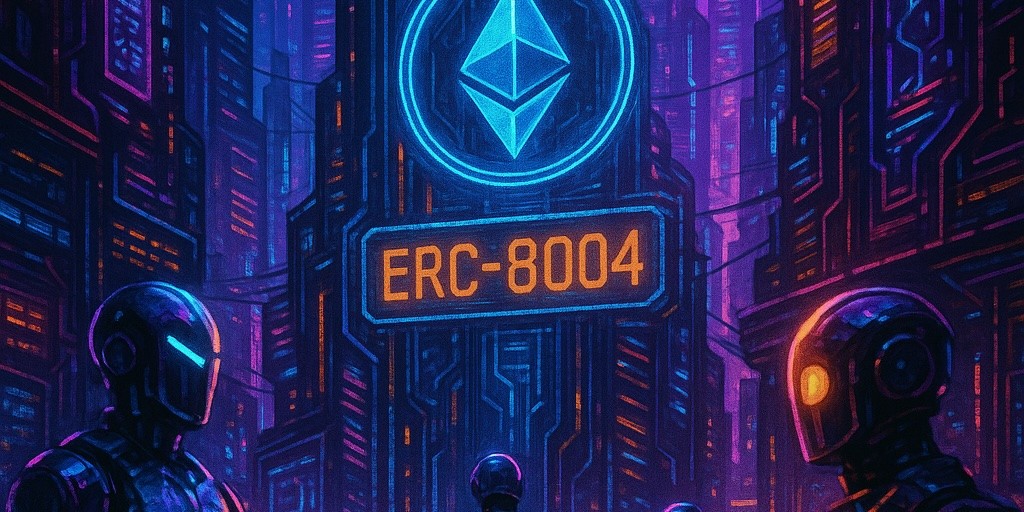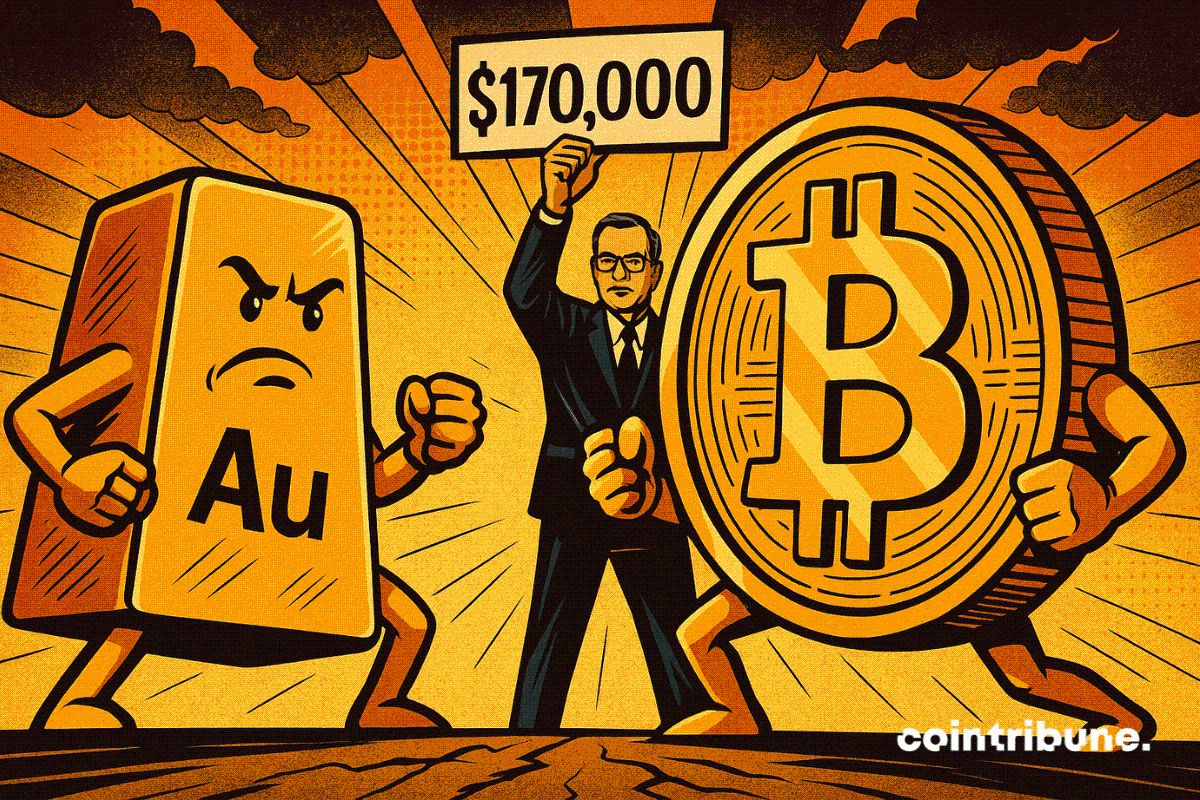Written by: TechFlow
Do you remember during this year’s Token 2049 in Singapore, the RaveDAO ENL1GHT Festival, a spectacular audio-visual event featuring three of the world’s top DJs, over 5,000 participants, and viral coverage across major social media platforms worldwide?
Recently, RaveDAO, the organizer of the event, announced that the TGE will take place on November 17, 2025, and the Genesis Membership NFT minting event will officially launch on November 11. Genesis holders will be eligible to participate in a lottery to win RAVE points and Tomorrowland tickets + flights, unlock future event benefits, and Gold Pass and above members will also receive points rewards redeemable for $RAVE.
From Dubai and Singapore to Tokyo and Seoul, RaveDAO is committed to delivering immersive experiences through music, fostering deeper human connections, and driving real users to seamlessly onboard to the blockchain. The consistent delivery of high-quality events has made “Produced by RaveDAO” a well-known brand among Web3 event-goers, and The Wall Street Journal has even described it as the “entertainment-driven Web3 benchmark.”
As the countdown to TGE begins, TechFlow had an in-depth conversation with Ron, RaveDAO’s Head of Operations.
Because RaveDAO has repeatedly gone viral through electronic music events, many people’s first impression is that it’s an event company. Ron pointed out this misconception and clearly defined RaveDAO:
RaveDAO is not an event company, but a new type of cultural infrastructure, or a Web3 cultural layer. Entertainment is humanity’s oldest consensus mechanism. RaveDAO aims to build an open ecosystem driven by entertainment, including a decentralized global entertainment brand, a community-driven cultural network, and an open sandbox for participatory economics, creating a true “cultural flywheel” that fuses real-world entertainment with Web3 technology. Every offline experience becomes a starting point for consensus between people and the blockchain, seamlessly bringing the real world on-chain.
Speaking to this vision, Ron mentioned that RaveDAO’s collaboration with WLFI during Korea Blockchain Week is a great example of entertainment-driven Web3 mass adoption:
Through partnerships with WLFI, PLVR, and Umy, RaveDAO has truly connected the entire journey—from travel, ticket purchase, event participation, to offline consumption and settlement—all can be completed with USD1, marking an important attempt to bring crypto payments into real life.
Facing the upcoming TGE, Ron also shared the “participatory economy” value loop under the $RAVE tokenomics:
The core mission of the $RAVE token is to make “participation” itself valuable. Every action by participants in the ecosystem, including buying tickets, creating, collaborating, sharing, voting, etc., can earn them real identity, rights, and rewards in the ecosystem via $RAVE. This is one of the key drivers for RaveDAO’s long-term sustainable development.
This issue will take us through Ron’s insights, delving into the behind-the-scenes story of RaveDAO’s breakthrough from 0 to 1 in electronic music, and the ecosystem flywheel driven by the trinity of “real scenarios + culture-driven + token circulation” under the core vision of the “Web3 cultural layer.”
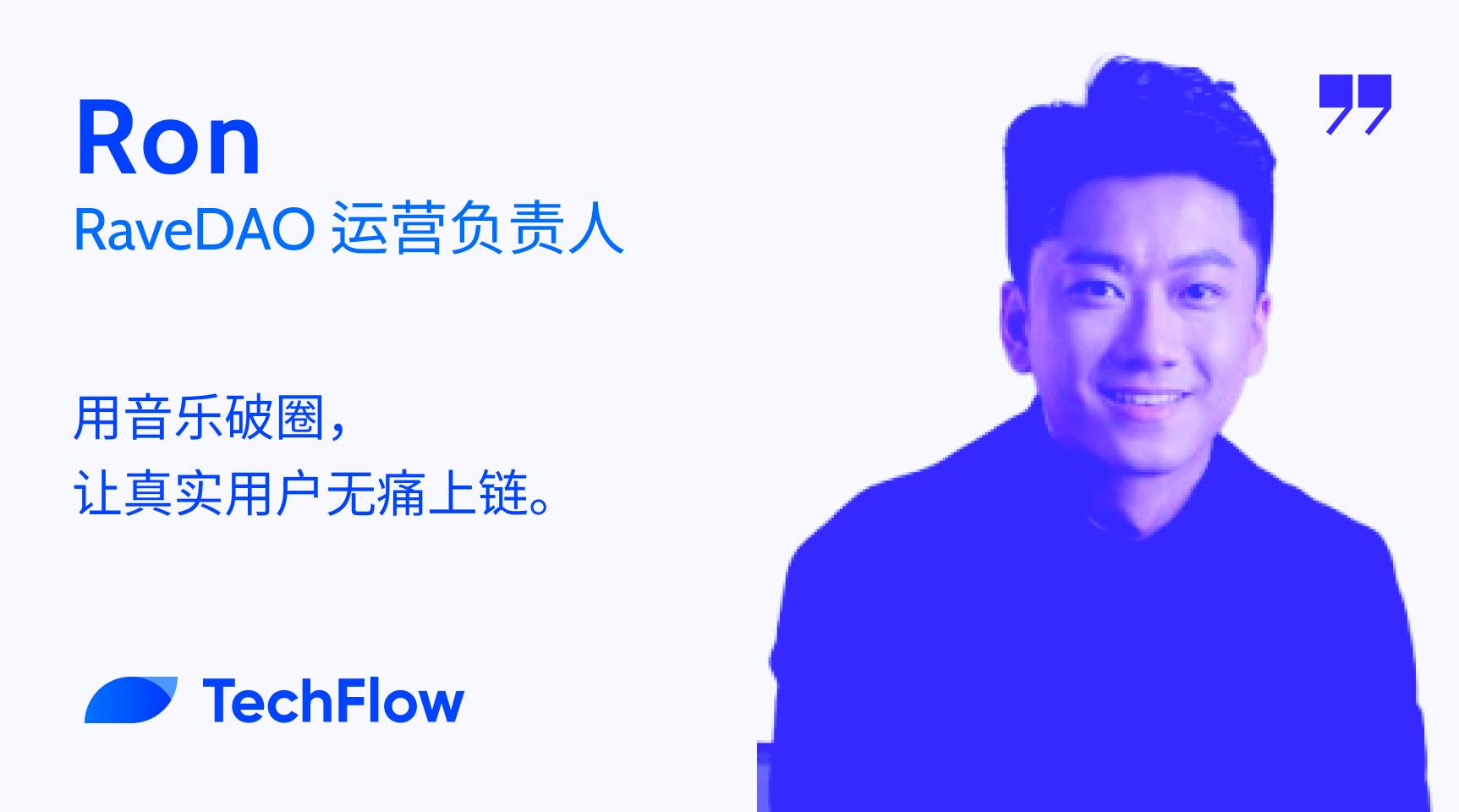
Not an Event Company, but a True “Cultural Flywheel” Integrating Entertainment and Web3 Technology
TechFlow: Please introduce yourself. How did you enter the Web3 industry? What inspired you to combine Web3 with live entertainment and found RaveDAO?
Ron:
Hello everyone, my name is Ron, and I am currently the Head of Operations at RaveDAO.
My educational background is in psychology. I majored in organizational psychology at Harvard, mainly studying the motivations behind people and group resonance. Later, I worked for several years in investment institutions, incubators, and venture capital funds, responsible for strategy and organizational management, and witnessed many projects go from 0 to 1 and then to IPO.
I first encountered the Web3 industry in 2016. Having worked in traditional enterprises, I deeply appreciated the value of Web3 and decided to devote myself fully to it.
The founding of RaveDAO was actually quite unexpected. In 2023, at DevCon in Istanbul, we hosted an after-party for about 200 people. There were no banners, no sales pitches, no whitepapers—just lights, rhythm, and fully immersed participants. Everyone was very engaged. The next day, many people came to ask us:
Will you host such events again? This was the first time I felt a deeper human connection in the crypto space.
At that moment, we realized that Web3 doesn’t lack capital, technology, or ideas; what it lacks are real-world scenarios and experiences that attract participation. Many projects have tens of millions of dollars in funding but don’t actually have real users. So we thought:
If a small event can gather 200 people, could larger music- and entertainment-driven events attract even more people to onboard to the blockchain?
This was the inspiration for RaveDAO: We decided to use entertainment as the connection point to enable real users to onboard seamlessly. What we want to build is not just an event brand, but an entry point for culture and experience, using real-world entertainment scenarios to bring Web3 back to the human dimension and truly feel its development.
TechFlow: If you had to define RaveDAO in one sentence, what would you say?
Ron:
Many people’s first impression of RaveDAO may be that we often organize music events, but we are not an event company. I would define RaveDAO as follows:
RaveDAO is an open ecosystem driven by entertainment as a medium, dedicated to bringing the real world on-chain, making every offline experience a starting point for consensus between people and the blockchain.
It is not simply a music festival or event company, but a new type of cultural infrastructure (Cultural Infrastructure): allowing art, community, technology, brands, and even philanthropy to happen on the same stage.
At RaveDAO, “entertainment” is no longer just sensory stimulation, but an entry point for everyone to truly experience Web3. We offer real-world experiences, including offline entertainment, payments, ticketing, data, and identity systems, connecting people, sparking emotions, and rebuilding consensus.
In short: We make entertainment the gateway to Web3, giving the on-chain world a cultural carrier and human connection (Cultural Layer).
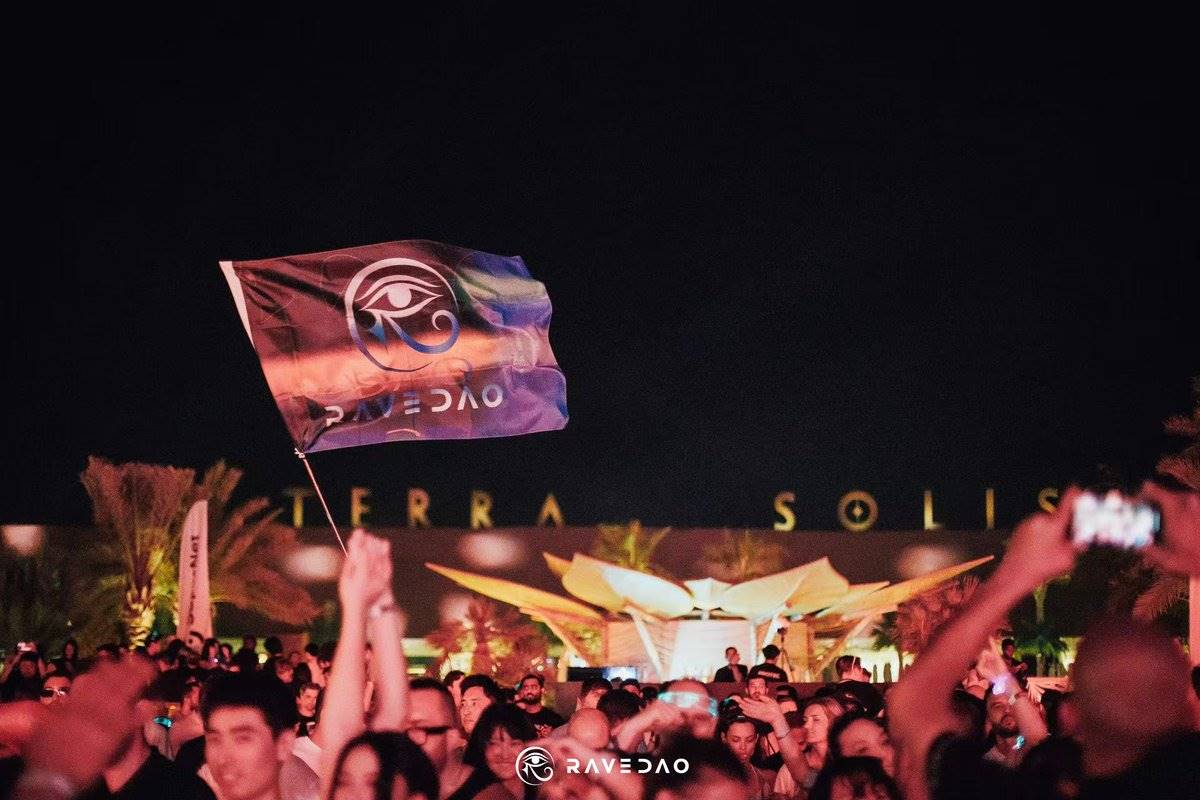
TechFlow: The RaveDAO whitepaper proposes a “Decentralised Tomorrowland + TEDx + Kickstarter” business model. Can you explain this in detail?
Ron:
Everyone is probably familiar with these three brands, but RaveDAO aims to combine these three modules to create a unique flywheel model, truly making entertainment an open ecosystem where everyone can participate.
Let me break down these three modules one by one.
First is the Decentralised Tomorrowland part. RaveDAO aims to create a globally mobile entertainment IP.
In an era of consumption downgrade, AI-induced indifference, and emotional emptiness, people crave real resonance more than ever.
However, traditional music festival models represented by Decentralised Tomorrowland, though large-scale and well-produced, are limited by geography, cost, and centralized operations, and participation costs are high.
People actually prefer smaller, more authentic, or more deeply communal events to build deeper connections.
RaveDAO, on the other hand, is mobile, aiming to create a global entertainment brand unconstrained by location. We use a decentralized model, making each event a node in a distributed global entertainment network. You can think of it as a borderless Tomorrowland: community-driven, blockchain-secured trust, and culture-driven connections. We call this RAVE 3.0: the return of meaning.
Next is the TEDx module. RaveDAO aims to achieve a decentralized brand co-creation model.
RaveDAO’s structure is similar to the relationship between TED and TEDx: RaveDAO’s flagship events are curated by the core team to ensure content and production quality, setting a flagship benchmark; RaveDAOx events are initiated by communities worldwide. We have already held several events in places like Hong Kong, Singapore, and Seoul, and will expand to Tokyo, Los Angeles, and more in the future.
Each community can apply to use RaveDAO’s IP and independently decide on venue, lineup, and style. We provide brand standards, promotional resources, and technical support. Each event also includes a charity component, with communities choosing local charity directions and deciding how part of the profits are allocated to local charities.
This series of mechanisms makes RaveDAO a truly decentralized brand network: every event is both the establishment of community consensus and an extension of brand culture.
The third module is Kickstarter. RaveDAO aims to build an entertainment-driven participatory economy.
While building Music IP, RaveDAO is also committed to creating an open entertainment sandbox. “Crowdfunding + co-creation” is the core logic. In this sandbox, whether you are a DJ, production team, public chain, wallet project, or payment system, you can test products, refine experiences, and validate the market on RaveDAO’s stage.
Meanwhile, every participant—audience, artists, brands, or community—can be an early supporter of the ecosystem, sharing in the profits and governance through $RAVE, and jointly driving event organization and brand expansion.
In other words, RaveDAO turns “audiences” into “participants,” and “events” into “economies,” allowing the energy of entertainment to circulate throughout the ecosystem.
In summary, by combining a decentralized global entertainment brand (Decentralised Tomorrowland), a community-driven cultural network (TEDx), and an open sandbox for participatory economics (Kickstarter), RaveDAO is a true “cultural flywheel” integrating real-world entertainment and Web3 technology.
TechFlow: Why did you choose to start with electronic music? What is the logic behind expanding into K-pop and Pop?
Ron:
In recent years, the world has been at a turning point. In the face of economic slowdown, consumption downgrade, and high costs of large-scale entertainment, people’s desire for “real experiences” has only grown stronger. Grand stages are fading, while community-based, immersive, and emotion-driven entertainment is rising. This is the background for our “Rave 3.0” concept.
Electronic music, after three eras of evolution, is one of the most connective forms of entertainment globally, capable of transcending language, borders, and culture. From a psychological perspective, electronic music is one of the best carriers for “emotional resonance between people”—as long as there is rhythm and energy, people can resonate. From an industry perspective, it is the most open, international, and experimental music form.
On this basis, we are expanding into more mainstream cultural fields such as K-pop and Pop. The logic is clear: different regions have different cultural “mother tongues”—East Asia’s idol culture, Western electronic culture, Middle Eastern festival culture, etc.—all can be fertile ground for RaveDAO.
We hope to make RaveDAOx (the community version of RaveDAO) a “cultural translation engine” to reach different countries, regions, and communities and create cultural resonance: In Korea, it may be the integration of K-pop and Web3; in Southeast Asia, it could be the crossover of DJs and local art; in the West, it might be an experimental ground for Pop and brand collaborations.
Electronic music is our key to the world, while the expansion into K-pop and Pop is our bridge to connect more cultures. But it’s important to emphasize that RaveDAO is not a spokesperson for any particular music genre, but an open ecosystem where different cultures can expand on Web3. Beyond electronic music, K-pop, and Pop, we will expand into more entertainment fields in the future.
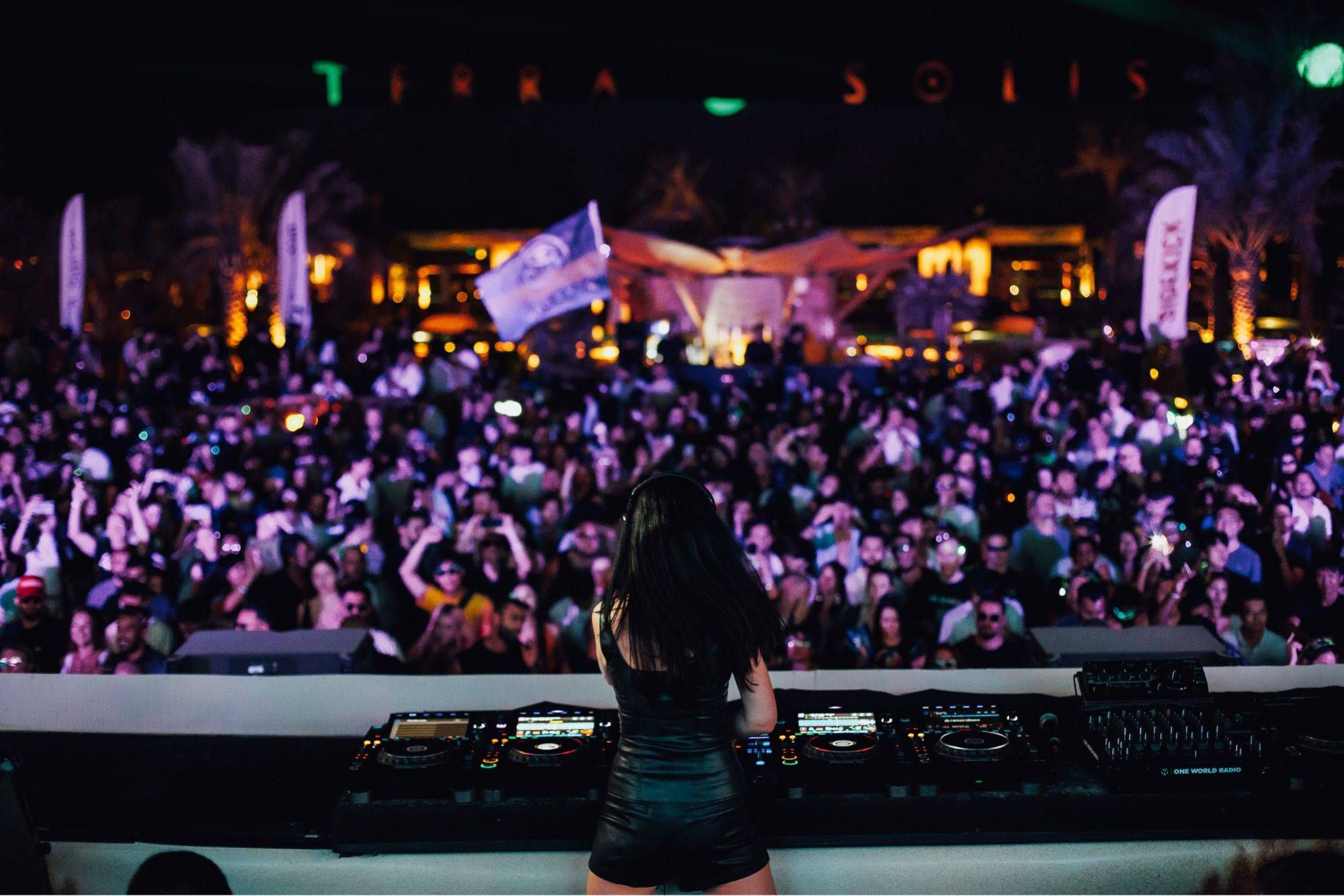
The Story Behind USD1: Building a Web3 Cultural Layer, Making Onboarding as Natural as Breathing
TechFlow: Currently, the biggest criticism of Web3 is the lack of positive externalities, i.e., the need for true mass adoption. How does RaveDAO use music, parties, and IP to let users naturally and seamlessly enter Web3?
Ron:
Mass adoption is a dimension that RaveDAO values greatly.
Many people talk about mass adoption, but if a product doesn’t find a way for users to truly feel its value during promotion, it’s hard to achieve real mass adoption. Many projects targeting mass adoption are actually aimed at Web3 industry users.
Crypto has Layer 1, Layer 2, Layer 3, but lacks a layer that people can “feel.”
We have always believed that technological development needs a cultural carrier. Without culture, technology is just a cold tool; but when you add culture, it gains warmth and can truly be accepted by people.
RaveDAO is not just about organizing events; it is about creating a Web3 “cultural layer” through the combination of entertainment, art, technology, and community, helping everyone better experience Web3.
Entertainment is our core strategy for building the Web3 cultural layer.
Entertainment and music are humanity’s oldest consensus mechanisms, and they can transcend borders, languages, and identities. No technical background is needed—once the rhythm starts, everyone can connect. It’s the most primitive social language.
We chose entertainment as the entry point because it has enough “stickiness” to make people want to participate, experience, and learn the story behind it. People are not attracted by “airdrops,” but by the experience itself.
Moreover, we believe the key to Web3 mass adoption lies in whether people want to use it in real scenarios and whether the experience is good. RaveDAO is committed to making onboarding as natural as breathing.
For example, through our partnership with ticketing and data system partner PLVR, users only need to register with an email to automatically generate their first wallet and can pay directly with Alipay, WeChat, credit card, or Apple Pay. After purchasing a ticket, it is immediately minted as an NFT and permanently stored on-chain. The whole process is seamless and painless, yet completes the entire onboarding journey. Users may not even realize they are “using blockchain,” and the experience is smoother than traditional ticketing.
This is our understanding of the correct path to mass adoption: technology should not be a barrier, but should be hidden behind the experience. This is what we call an entertainment-driven crypto ecosystem loop.
TechFlow: According to previous news, RaveDAO’s event with WLFI was WLFI’s first offline event and the world’s first USD1 offline application case. How did this collaboration come about? What was the user experience of USD1 payments at the event?
Ron:
Since 2024, RaveDAO has hosted at least 20+ global events. One major insight is that while crypto is not short of technological innovation, it lacks truly grounded scenarios that people want to use. In this regard, RaveDAO is the perfect testing ground.
RaveDAO has real users, ticketing, and consumption payments, and the entire service chain has strong offline attributes, making us the world’s first case of USD1 offline application.
In this collaboration, we didn’t just enable ticketing as a single scenario, but worked with WLFI and multiple USD1 ecosystem partners to build rich application scenarios for USD1.
For ticketing, through our partner PLVR, attendees could use USD1 to directly purchase tickets for the event. On-site, they could continue to use USD1 to buy drinks, book tables, and more services. The entire transaction chain—from online ticket sales, offline consumption, to settlement—could be completed with USD1.
In addition, RaveDAO partnered with Web3 travel platform Umy, allowing users to book hotels and flights with crypto and enjoy extra discounts. At this event in Korea, many overseas guests, DJs, and sponsors could directly use USD1 to pay for flights, accommodation, and on-site consumption.
Through collaboration with WLFI, PLVR, and Umy, RaveDAO truly connected the entire journey: from travel, ticket purchase, event participation, to offline consumption and settlement, all could be completed with USD1. This is a real attempt to bring crypto payments into reality and once again proves that RaveDAO is not just telling stories, but making them happen.
TechFlow: Crypto entertainment seems to be about more than just entertainment; it also involves payments. The x402 protocol is also very popular recently. How do you combine offline entertainment events with crypto payments?
Ron:
We recently published a research article on x402. In fact, before x402 became popular, we had already integrated it. RaveDAO can be said to be the first real case of integrating x402 protocol ticketing with offline events.
At this year’s Dubai Token2049, during our event with Tomorrowland Terra Solis, some participants purchased RaveDAO tickets via the x402 protocol. That is, after completing payment and identity verification on-chain, they directly entered the offline event. This was a milestone attempt—x402 was no longer just a protocol-level technical demo, but truly integrated into real-world entertainment experiences.
We don’t want users to feel they are “deliberately using Web3 technology” when experiencing Web3. In RaveDAO’s scenarios, whether it’s x402 payments, USD1 stablecoin payments, or NFT tickets, the entire process is zero-barrier and seamless: users can register a wallet with their email, and after payment, the system automatically mints an NFT ticket, and the wallet address is automatically verified for entry. All the technology is handled in the background, and the front-end experience is just like regular ticketing.
We want to make crypto payments as simple as using Apple Pay, so users don’t feel “this is blockchain,” but rather “this is so smooth.”
Every event can be a “real-world testing ground” for payment, wallet, and stablecoin projects. RaveDAO’s goal has never been just to throw parties, but to promote real crypto usage through entertainment. This is what we call “Entertainment-Driven Crypto Adoption.” When payments and entertainment are seamlessly integrated, the crypto economy truly enters daily life.
TechFlow: Based on your experience, what are the advantages of the NFT ticketing system compared to traditional ticketing?
Ron:
Traditional tickets are a one-time entry credential—once used, that’s it. We can’t see the participant profile or understand their continued engagement in the ecosystem.
NFT ticketing is more than just a ticket; it can be seen as an “on-chain passport,” an identity system that records the owner’s entire entertainment journey:
When users participate in RaveDAO events, their passport gets a new stamp, including which city, what event, and in what capacity they participated. These records don’t disappear after the event but are permanently stored on-chain. The more “visa stamps” on the passport, the richer and more valuable the user’s on-chain identity becomes.
In the future, this data can unlock many exclusive benefits, such as priority ticket purchase, limited-edition merchandise, RAVE token rewards, partner brand airdrops, artist collaborations, and more.
Compared to the traditional entertainment industry, NFT ticketing’s biggest difference is that it extends the experience and enables data interoperability. Specifically, in RaveDAO’s system, every offline experience is recorded, recognized, and continued and rewarded in the next event.
Traditional ticketing sells entry; RaveDAO’s NFT ticketing sells identity and connection. This is the greater advantage we see in NFT ticketing.
$6 Million Revenue Empowers Global Philanthropy, $RAVE Achieves “Participatory Economy” Value Loop
TechFlow: According to official data, RaveDAO has about a 20% profit margin per event. Can you share your current revenue status and the main sources?
Ron:
Over the past year, RaveDAO’s events have not only achieved leapfrog growth in scale and brand, but also proved the sustainability of our business model through solid profitability.
Specifically, RaveDAO achieved about $3 million in total revenue in 2025, is expected to reach $6 million in 2026, and is projected to exceed $12 million in 2027.
This revenue mainly comes from three areas:
-
Event and ticketing revenue: ticket and beverage sales from global flagship events and local RaveDAOx events;
-
Brand and ecosystem partnerships: including strategic sponsorships from BNB Chain, Polygon, Bitget, OKX, Base, Aptos, DeCard, and others;
-
Derivative products and IP licensing: including brand collaborations, top artist partnerships, and the upcoming Genesis Membership Pass (NFT membership pass).
Although profitability is good, I’d rather share where RaveDAO’s profits go. RaveDAO’s philosophy has always been:
Culture is not just about resonance; it can also extend goodwill.
In the past year, our event proceeds have funded over 400 Nepali cataract patients to regain their sight and supported 150 meditation and mental health projects in Seattle, USA.
Through a series of philanthropic initiatives, users feel they are not just playing, but participating in something more meaningful. At the same time, RaveDAO is becoming the first native entertainment IP from Web3 to be recognized by the mainstream entertainment industry. We want the world to see that Web3 is not just about stories on-chain; it can be the light that creates real connections in the real world, and that’s something I’m very proud of.
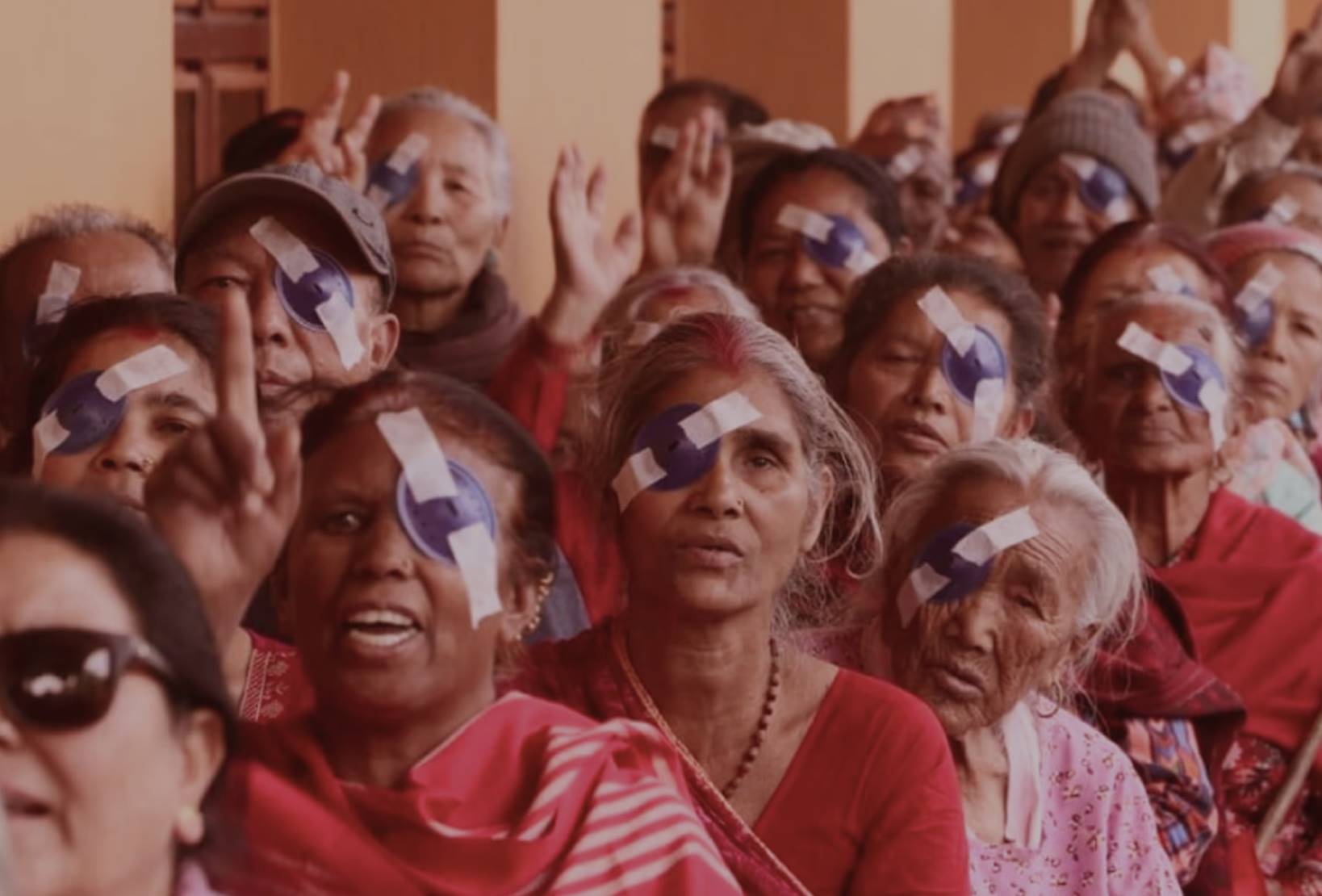
TechFlow: In such a positive feedback system, why does RaveDAO need to issue a token?
Ron:
We believe that entertainment and music are humanity’s most primitive, most barrier-crossing, and most enduring mediums—they are the starting point for emotion, socialization, culture, and value circulation.
In the context of Web3, a token is not just a financial tool, but a participation credential (Participation Token).
Our $RAVE token is not for speculation, but to make “participation” itself valuable. Every action by participants in the ecosystem—buying tickets, creating, collaborating, sharing, voting, etc.—can earn them real identity, rights, and rewards in the ecosystem via $RAVE.
In the future, $RAVE will run through the entire RaveDAO ecosystem, becoming the universal language connecting online and offline, including:
-
Consumption scenarios: ticket purchase, beverages, merchandise, on-site payments;
-
Governance scenarios: DAO proposals and community voting;
-
Incentive scenarios: content creation, promotion, community contribution rewards;
-
Ecosystem collaboration: brand licensing and local incentives for RaveDAOx communities.
For users, the long-term value of holding $RAVE includes three aspects:
-
Long-term value growth from brand expansion: As events continue to be held in Dubai, Singapore, Seoul, Amsterdam, Hong Kong, and other locations, RaveDAO’s brand awareness, partners, and participants are rapidly growing, further increasing $RAVE’s real-world use cases and cultural influence, and driving token value spillover.
-
Ecosystem participation and early supporter benefits: Early holders can obtain DAO governance voting and proposal rights, global event priority and community incentives, support emerging DJs, participate in creation and earn rewards through the Stake-to-Support mechanism, and have opportunities as producers or project parties.
-
Long-term cultural value and identity symbol: As the ecosystem matures, $RAVE will become a cultural identity symbol. It not only represents your on-chain assets, but also your belonging to a global community and a cultural movement that believes entertainment, connection, and goodwill can change the world.
What we want to build is not just an entertainment token, but a brand new entertainment economic system centered on the “participation economy,” where every participant, producer, brand, sponsor, or volunteer can receive value rewards for their real contributions. This is the core mission of the $RAVE token.
TechFlow: Every RaveDAO event is quite high-profile. As a community-driven, non-fundraising project, how did RaveDAO go from 0 to 1? How will you achieve sustainable development in the future?
Ron:
This is something we’ve been thinking about since day one. What makes RaveDAO special is that we didn’t start with fundraising, but grew through real scenarios, cash flow, and cultural consensus.
First, RaveDAO’s business model and revenue sources are very clear. As mentioned earlier, RaveDAO’s revenue includes event and ticket sales, brand and public chain sponsorships, IP licensing and collaboration, and NFT and membership systems. These are not short-term gains from token prices or fundraising, but real operational income, allowing RaveDAO to achieve positive cash flow within a year of its founding.
Second, traditional projects are driven by capital, while RaveDAO is driven by culture. The impact of every event, artist collaboration, and media coverage continues to enhance RaveDAO’s brand equity and cultural premium. In other words, our brand power itself is a sustainable economic engine.
In addition, the value loop supported by the $RAVE token further empowers the ecosystem. Events, artists, community members, and partner brands all form a closed loop around $RAVE: consumption generates income → profits are returned to the community → the community creates more content → content drives more consumption. This is what we call the Participation Economy, which allows value to flow rather than accumulate, and the ecosystem to grow rather than be depleted.
Finally, thanks to RaveDAO’s DAO-style distributed organizational structure and efficient execution. RaveDAO’s operations team remains small and elite, with a core team of fewer than 10 people covering planning, production, branding, operations, and business development. Global events are expanded through RaveDAOx community nodes, reducing labor and cost burdens. This allows us to maintain high-quality execution while achieving efficient global expansion.
In summary, RaveDAO’s sustainability comes from the trinity of “real scenarios + culture-driven + token circulation.”
2026: A Year of “Globalization × Community × Mainstreaming”
TechFlow: What major collaborations or announcements does RaveDAO have coming up? What important plans are there for next year?
Ron:
First, we just co-hosted the Top 101 Producer Awards with 1001Tracklists (over 1 million followers on IG), the world’s largest music producer community, at Amsterdam Dance Event (ADE), with over 2,000 attendees. This awards ceremony, based on real data, provided a more objective and fair ranking for global producers and marked the first time the traditional music industry recognized RaveDAO’s brand and influence by industry standards.
Next, we will officially announce a series of collaborations with top Asian music festivals, including Thailand’s largest electronic music festival 808 Festival (one of DJ Mag’s global top 100 festivals) and Asia’s largest New Year’s Eve music festival NEON Countdown (40,000+ audience). These partnerships mark RaveDAO’s official entry from the Web3 stage into the core of mainstream entertainment.
In addition, this December we will collaborate with INS Land in Hong Kong to bring the immersive Tomorrowland China experience to Hong Kong. We will also work with Asia’s top touring company Collective Minds to bring the world’s No.1 Techno female DJ Charlotte de Witte to Singapore.
Finally, we have a collaboration with a top global entertainment group to be announced soon. While we can’t reveal much yet, it will be another major breakthrough for RaveDAO’s entry into the mainstream entertainment industry.
For the upcoming 2026, we will continue to accelerate RaveDAO’s global expansion and ecosystem implementation, focusing on three main directions:
-
Continued expansion of global flagship events: Continue to host RaveDAO flagship event series in multiple cities, including Hong Kong, Dubai, Singapore, and Seoul. These cities represent our core touchpoints in the Asian entertainment and Web3 ecosystem. Each event will be further upgraded in scale, experience, and content—not just music or performance, but a cross-disciplinary cultural laboratory. We hope to bring different cultures worldwide on-chain with RaveDAO.
-
Accelerated rollout of community-driven RaveDAOx: Focus on implementing the RaveDAOx (community-driven version) model. We want more communities, labels, DJs, and creators to become co-builders of RaveDAO and bring Web3 entertainment culture to every city.
-
Deep collaboration with the mainstream entertainment industry: Continue and upgrade collaborations with traditional entertainment giants. In the future, RaveDAO will announce partnerships with several global top music festival brands, officially moving from the Web3 stage into the core circle of mainstream entertainment.
It can be said that 2026 will be a year of “globalization × community × mainstreaming” for RaveDAO, and we are very much looking forward to it.
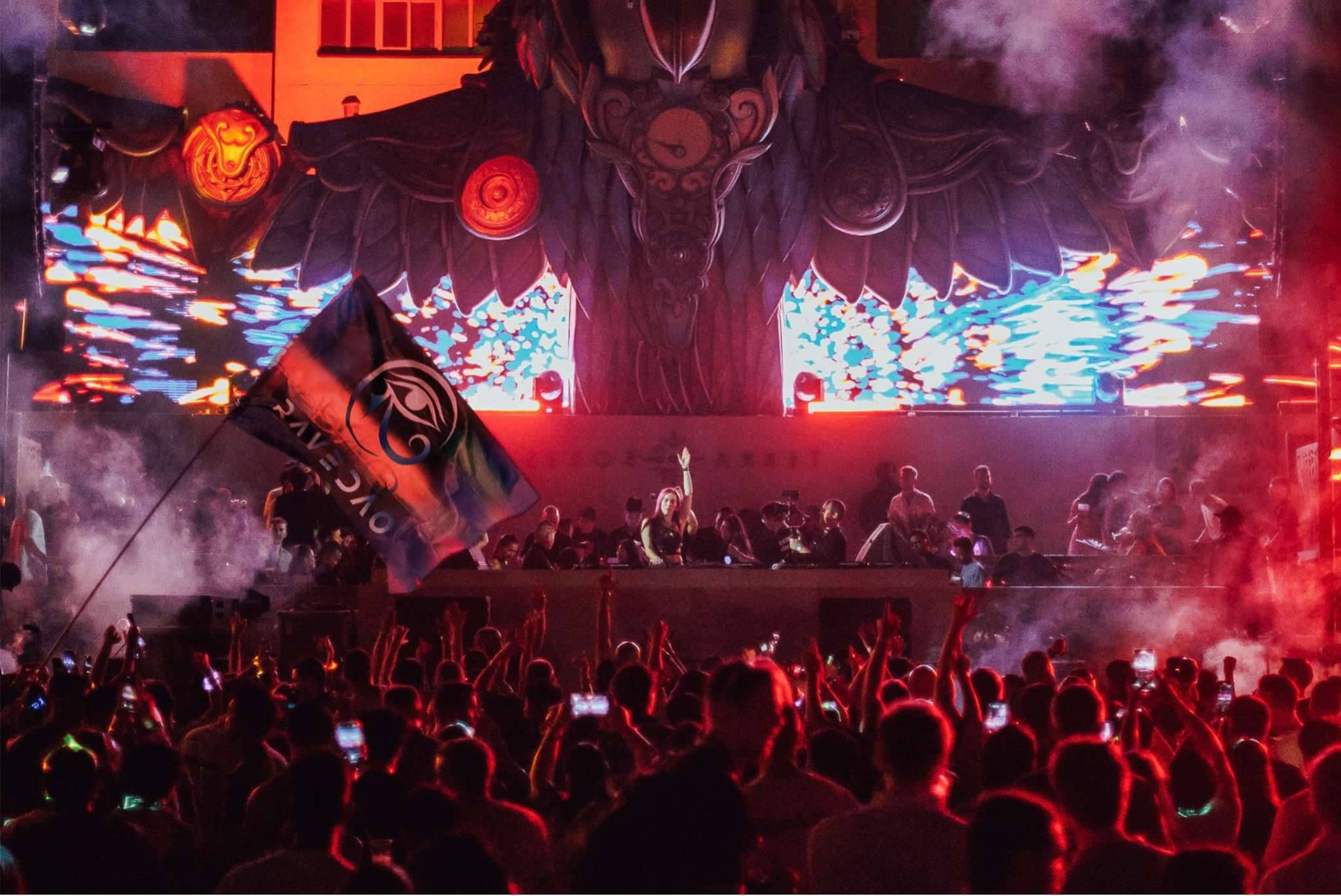
TechFlow: One last question. Along the way, you’ve experienced setbacks, felt the team’s strong cohesion, and now many major initiatives are about to be launched. For you personally, what is your most memorable experience at RaveDAO?
Ron:
From a small community to a global entertainment IP, we have experienced many “miracle moments” along the way.
Our team is very small, and what impressed me most was RaveDAO’s first event at Dubai Token2049 in 2024. We encountered the biggest rainstorm in Dubai in 75 years, faced venue power outages, artists stranded in Milan, and attendees trapped on flooded highways. We almost lost hope, but in the end, the event was a complete success, with over 4,000 people attending. That night’s energy made us realize for the first time: belief and resonance are the greatest productivity.
This experience quickly led to our second milestone: during the 2025 Dubai Token2049, RaveDAO partnered with top Web2 music festival brand Tomorrowland Terra Solis to create an immersive event for over 4,000 people in the desert. The event even attracted coverage from The Wall Street Journal, and RaveDAO truly became a cultural phenomenon, stepping onto the global stage from a Web3 side event.
Next was RaveDAO’s collaboration with WLFI at Korea Blockchain Week (KBW), our third milestone, where we achieved full-chain offline payment with the USD1 stablecoin for the first time: from ticket purchase and drinks to hotel booking, all could be paid with crypto. Crypto payments were used in real life for the first time, an important exploration of Web3 technology entering mainstream entertainment scenarios.
The most recent milestone was at the 2025 Singapore Token2049, where we hosted the RaveDAO ENL1GHT Festival. Supported by DeCard by DCS, the event attracted over 5,000 participants, the venue was packed, and Singapore’s social media was flooded with coverage. The very next day, traditional entertainment industry and top global record companies approached us for collaboration.
RaveDAO started with a 200-person after-party in Istanbul and, in just one year, grew into the main platform behind a 5,000-person celebration in Singapore, showing everyone that a Web3 brand can break into the mainstream entertainment industry.
RaveDAO is not just about organizing events; it is creating a Web3-native cultural layer (Cultural Layer) by combining entertainment, technology, and community.


